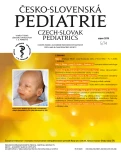Severe zinc deficiency of premature newborns
Authors:
L. Hušková; Z. Tomšíková; V. Axmanová
Authors‘ workplace:
Neonatologické oddělení Perinatologického centra IP, Nemocnice České Budějovice, a. s.
Published in:
Čes-slov Pediat 2019; 74 (5): 280-283.
Category:
Case Report
Overview
We present two cases of premature newborns with a severe zinc deficiency. Both children were born in our department. At the time of hospital discharge they were breastfed exclusively and throve. There were no signs of dermatitis or any other illness. Between the 3rd and 4th month of chronological age both children presented skin lesions and a failure to thrive. Within a differential diagnosis we considered a low serum zinc level, which was confirmed. After oral zinc supplementation a rapid clinical improvement occured within a few days, followed by a complete resolution of symptoms.
Severe zinc deficiency can be caused by either genetic autosomal recessive disorder acrodermatitis enteropathica or acquired condition (e.g. transient zinc deficiency in an exclusively breastfed premature infant, short bowel syndrome, malabsorption syndromes etc.) [1, 2, 3]. The illness is manifested by skin lesions over the extremities, anogenital and perioral areas. Mucous parts of the body can also be affected, the intestine lesions lead to diarrhoea. Other clinical signs of severe zinc deficiency include recurrent infection based on immunodeficiency, alopecia, growth retardation, failure to thrive and other nonspecific symptoms [1, 2].
Keywords:
zinc deficiency – acrodermatitis enteropathica
Sources
1. Beigi PKM, Maverakis E. Acrodermatitis Enteropathica, A Clinician‘s Guide. New York: Springer, 2015 : 7–22, 29–35, 39–41, 63–72. ISBN 978-3-319-17819-6.
2. Abrams S. Zinc deficiency and supplementation in children and adolescents. UpToDate Wolters Kluwer. Dostupné na https://www.uptodate.com/contents/zinc-deficiency-and-supplementation-in-children-and-adolescents.
3. Stapleton K, O‘Loughlin E, Relic P. Transient zinc deficiency in a breast-fed premature infant. Australas J Dermatol 1995; 36 : 157–159.
4. Ezzati M, Lopez A, Rodgers A, et al. Comparative quantification of health risks: global and regional burden of disease attributable to selected major risk factors. In: Caulfield L, Black R. Zinc Deficiency. Hong Kong: WHO, 2004 : 257–279. ISBN 92-4-158031-3.
5. Maverakis E, Fung MA, Lynch PJ, et al. Acrodermatitis enteropathica and an overview of zinc metabolism. J Am Acad Dermatol 2007; 56 : 116–124.
6. Pazirandeh S, Burns DL, Griffin IJ, et al. Overview of dietary trace minerals. UpToDate Wolters Kluwer. Dostupné na https://www.uptodate.com/contents/overview-of-dietary-trace-minerals.
7. Terrin G, Berni Canani R, Di Chiara M, et al. Zinc in early life: A key element in the fetus and preterm neonate. Nutrients Dec 2015; 7 (12): 10427–10446.
8. Gleason CA, Juul SE. Avery‘s Diseases of the Newborn. Philadelphia: Elsevier, 2017. ISBN: 978-0-323-40139-5.
9. Wang H, Hu YF, Hao JH, et al. Maternal zinc deficiency during pregnancy elevates the risks of fetal growth restriction: a population-based birth cohort study. Sci Rep 2015; 5 : 11262.
10. Gibson RS, King JC, Lowe N. A review of dietary zinc recommenda-tions. Food Nutr Bull 2016; 37 (4): 443–460.
11. Roohani N, Hurrell R, Kelishadi R, et al. Zinc and its importance for human health: An integrative review. J Res Med Sci 2013; 18 : 144–157.
12. Stevens J, Lubitz L. Symptomatic zinc deficiency in breast-fed term and premature infants. J Paediatr Child Health 1998; 34 : 97–100.
13. Chue CD, Rajpar SF, Bhat J. An acrodermatitis enteropathica-like eruption secondary to acquired zinc deficiency in an exclusively breast-fed premature infant. Int J Dermatol 2008 Apr; 47 : 372–373.
Labels
Neonatology Paediatrics General practitioner for children and adolescentsArticle was published in
Czech-Slovak Pediatrics

2019 Issue 5
- What Effect Can Be Expected from Limosilactobacillus reuteri in Mucositis and Peri-Implantitis?
- The Importance of Limosilactobacillus reuteri in Administration to Diabetics with Gingivitis
-
All articles in this issue
- The impact of a child’s disability on sibling relationship in the family
- Premature newborn with severe central hypotonia and cryptorchidism
- A severe form of celiac disease – case report
- Severe zinc deficiency of premature newborns
- Life-threatening hemoptysis in single ventricle patients
- Eating disorders – anorexia nervosa and bulimia nervosa, the most serious somatic and metabolic complications. Methods of their realimentation. Summary of our 30-years of experience from the internist point of view
- Poruchy polykání v dětském věku
- Odešla MUDr. Ema Alena Kubíková-Kouřilová, CSc.
- Czech-Slovak Pediatrics
- Journal archive
- Current issue
- About the journal
Most read in this issue
- Eating disorders – anorexia nervosa and bulimia nervosa, the most serious somatic and metabolic complications. Methods of their realimentation. Summary of our 30-years of experience from the internist point of view
- Premature newborn with severe central hypotonia and cryptorchidism
- Severe zinc deficiency of premature newborns
- Poruchy polykání v dětském věku
